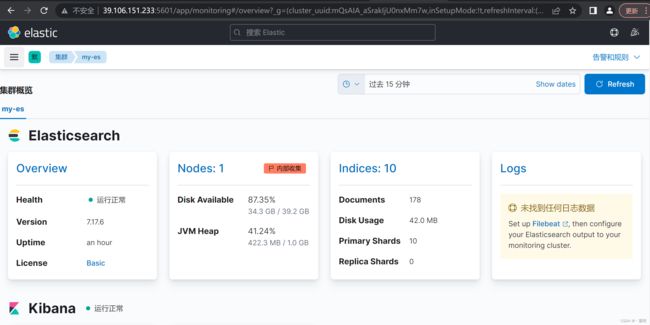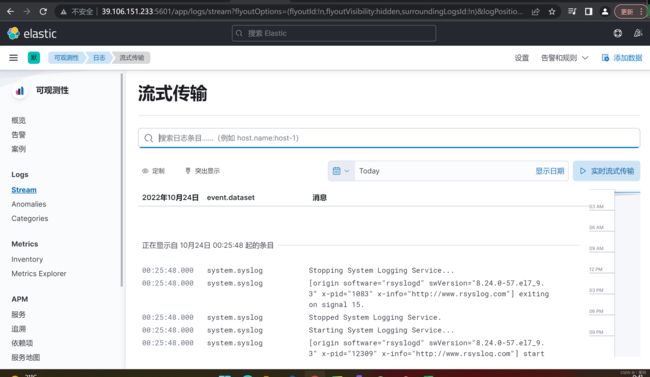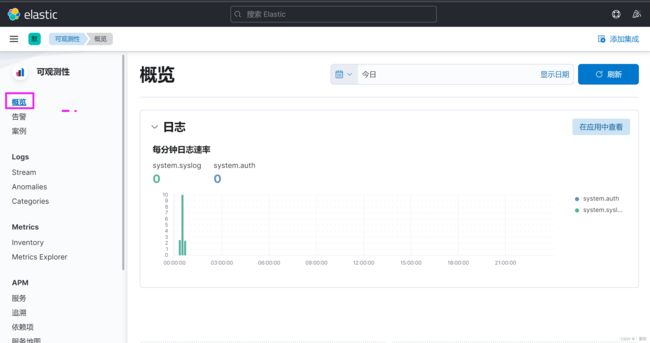【2022】快速部署一个可用的EFK-7.17架构
目录
- 0.环境准备
- 1.部署Elasticsearch服务
- 2.部署Kibana服务
- 3.部署Filebeat服务
- 4.相关链接
本文意为快速拉起一个可用的EFK开发测试环境,不会涉及高级配置。
0.环境准备
192.168.0.5 centos7.9
192.168.0.4 es-node01
192.168.0.3 kibana
1.部署Elasticsearch服务
如果你有多台es节点想组成集群,请参考步骤4内容
- 下载及安装es服务
wget https://artifacts.elastic.co/downloads/elasticsearch/elasticsearch-7.17.6-x86_64.rpm
wget https://artifacts.elastic.co/downloads/elasticsearch/elasticsearch-7.17.6-x86_64.rpm.sha512
yum install perl-Digest-SHA -y
shasum -a 512 -c elasticsearch-7.17.6-x86_64.rpm.sha512
sudo rpm --install elasticsearch-7.17.6-x86_64.rpm
- 修改jvm.options配置
注意:安装es服务会自带openjdk,也可以自行安装其他jdk
[root@es-node01 ~]# vim /etc/elasticsearch/jvm.options
-Xms1g
-Xmx1g
- 修改es配置文件
[root@es-node01 ~]# vim /etc/elasticsearch/elasticsearch.yml
cluster.name: my-es
node.name: es-node01
path.data: /var/lib/elasticsearch
path.logs: /var/log/elasticsearch
network.host: 192.168.0.4
http.port: 9200
discovery.seed_hosts: ["192.168.0.4"]
cluster.initial_master_nodes: ["192.168.0.4"]
- 启动服务并设置开机自启动
systemctl enable --now elasticsearch.service
- 查看状态
[root@es-node01 ~]# curl 192.168.0.4:9200
{
"name" : "es-node01",
"cluster_name" : "my-es",
"cluster_uuid" : "mQsAIA_aSrakIjU0nxMm7w",
"version" : {
"number" : "7.17.6",
"build_flavor" : "default",
"build_type" : "rpm",
"build_hash" : "f65e9d338dc1d07b642e14a27f338990148ee5b6",
"build_date" : "2022-08-23T11:08:48.893373482Z",
"build_snapshot" : false,
"lucene_version" : "8.11.1",
"minimum_wire_compatibility_version" : "6.8.0",
"minimum_index_compatibility_version" : "6.0.0-beta1"
},
"tagline" : "You Know, for Search"
}
[root@es-node01 ~]# curl 192.168.0.4:9200/_cat/nodes
192.168.0.4 45 96 8 0.07 0.20 0.13 cdfhilmrstw * es-node01
2.部署Kibana服务
- 下载及安装Kibana服务
wget https://artifacts.elastic.co/downloads/kibana/kibana-7.17.6-x86_64.rpm
sudo rpm --install kibana-7.17.6-x86_64.rpm
- 修改kibana配置文件,修改以下几项基础配置,其他使用默认即可
[root@kibana ~]# vim /etc/kibana/kibana.yml
# 允许访问kibana的主机
server.host: "0.0.0.0"
# 如果有多个es节点,可以在后面加上:[“http://es1”“http://es2”]
elasticsearch.hosts: ["http://192.168.0.4:9200"]
# 设置语言
i18n.locale: "zh-CN"
- 启动kibana服务
systemctl enable --now kibana.service
- 查看状态
[root@kibana ~]# netstat -utpln
tcp 0 0 0.0.0.0:5601 0.0.0.0:* LISTEN 12185/node
3.部署Filebeat服务
- 下载及安装Filebeat
curl -L -O https://artifacts.elastic.co/downloads/beats/filebeat/filebeat-7.17.6-x86_64.rpm
sudo rpm -vi filebeat-7.17.6-x86_64.rpm
- 配置Filebeat连接es集群
[root@centos7 ~]# vim /etc/filebeat/filebeat.yml
# 配置kibana连接
setup.kibana:
host: "192.168.0.3:5601"
# 配置es连接
output.elasticsearch:
hosts: ["192.168.0.4:9200"]
- 配置rsyslog把日志归档在一个文件,没有的话yum安装一下
[root@centos7 ~]# vim /etc/rsyslog.conf
*.* /var/log/system.log
[root@centos7 ~]# systemctl restart rsyslog.service
- 配置filebeat收集系统日志
# 开启系统模块
[root@centos7 ~]# filebeat modules enable system
# 配置系统模块
[root@centos7 ~]# vim /etc/filebeat/modules.d/system.yml
var.paths: ["/var/log/system.log"]
# 加载素材资源
[root@centos7 ~]# filebeat setup -e
Loaded Ingest pipelines #最后显示
- 启动filebeat服务
[root@centos7 ~]# systemctl enable --now filebeat.service
4.相关链接
【2022】Elasticsearch-7.17.6集群部署
这部分内容就到这里,高级内容会在以后的内容中出现





